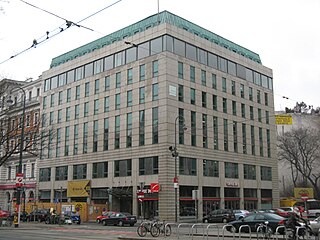Karl Borromäus Maria Heinrich Graf von Spreti was a German diplomat. He is best known as the West German Ambassador to Guatemala from 1968 until his assassination in 1970. The story of his assassination by Guatemalan guerillas was depicted in a 1970 book, Why Karl von Spreti Died, by Ryszard Kapuściński.

The United Nations Convention Against Transnational Organized Crime is a 2000 United Nations-sponsored multilateral treaty against transnational organized crime.
An attack on the Saudi embassy in Khartoum took place on 1 March 1973. It was carried out by the Black September Organization. Ten diplomats were taken hostage. After President Richard Nixon stated that he refused to negotiate with terrorists, and insisted that "no concessions" would be made, the three Western hostages were killed.
The West German Embassy siege in Stockholm, Sweden, was a hostage standoff initiated by the Red Army Faction (RAF) on 24 April 1975. Collectively, the attackers referred to themselves as Kommando Holger Meins, after Holger Meins, an RAF member who had died of starvation during a (collective) hunger strike in Wittlich Prison on 9 November 1974.

The Revolutionary Cells were a self-described "urban guerrilla" organisation that was active between 1973 and 1995. The West German Interior Ministry described it as one of West Germany's most dangerous leftist terrorist groups in the early 1980s. According to the office of the German Federal Prosecutor, the Revolutionary Cells claimed responsibility for 186 attacks, of which 40 were committed in West Berlin.

Peter Lorenz was a German politician of the Christian Democratic Union (CDU).
In law, the principle of aut dedere aut judicare refers to the legal obligation of states under public international law to prosecute persons who commit serious international crimes where no other state has requested extradition. However, the Lockerbie case demonstrated that the requirement to extradite or prosecute is not a rule of customary international law. The obligation arises regardless of the extraterritorial nature of the crime and regardless of the fact that the perpetrator and victim may be of alien nationality. It is generally included as part of international treaties dealing with an array of transnational crimes to facilitate bringing perpetrators to justice.
The Terrorist Financing Convention is a 1999 United Nations treaty designed to criminalize acts of financing acts of terrorism. The convention also seeks to promote police and judicial co-operation to prevent, investigate and punish the financing of such acts. As of October 2018, the treaty has been ratified by 188 states; in terms of universality, it is therefore one of the most successful anti-terrorism treaties in history.
The Niue Treaty on Cooperation in Fisheries Surveillance and Law Enforcement in the South Pacific Region or Niue Treaty is a multilateral treaty of members of the Pacific Islands Forum Fisheries Agency to enhance their ability to enforce effectively their fisheries laws, and deter breaches.

On December 21, 1975, six terrorists attacked the semi-annual meeting of OPEC leaders in Vienna, Austria; the attackers took more than 60 hostages after killing an Austrian policeman, an Iraqi OPEC security officer, and a Libyan economist. Several other individuals were wounded. The self-named "Arm of the Arab Revolution" group was led by Carlos the Jackal. The siege resulted in complex diplomatic negotiations. It ended two days later, after flights to Algiers and Tripoli, with all the hostages and terrorists walking away from the situation. The fact that this was one of the first times that Arab states were targeted by terrorists also led to them being more cooperative in developing antiterrorism efforts at the United Nations.
The Hague Hijacking Convention is a multilateral treaty by which states agree to prohibit and punish aircraft hijacking. The convention does not apply to customs, law enforcement or military aircraft, thus it applies exclusively to civilian aircraft. The convention only addresses situations in which an aircraft takes off or lands in a place different from its country of registration. The convention sets out the principle of aut dedere aut judicare—that a party to the treaty must prosecute an aircraft hijacker if no other state requests his or her extradition for prosecution of the same crime.
The Protection of Diplomats Convention is a United Nations anti-terrorism treaty that codifies some of the traditional principles on the necessity of protecting diplomats.
The Convention for the Suppression of Unlawful Acts against the Safety of Civil Aviation is a multilateral treaty by which states agree to prohibit and punish behaviour which may threaten the safety of civil aviation.
The Convention on the Marking of Plastic Explosives for the Purpose of Detection is a multilateral anti-terrorism treaty that aims to prohibit and prevent the manufacture or storage of unmarked plastic explosives.
The Convention for the Suppression of Unlawful Acts against the Safety of Maritime Navigation or SUA Convention is a multilateral treaty by which states agree to prohibit and punish behaviour which may threaten the safety of maritime navigation.
The Protocol for the Suppression of Unlawful Acts against the Safety of Fixed Platforms Located on the Continental Shelf is a multilateral treaty by which states agree to prohibit and punish behaviour which may threaten the safety of offshore fixed platforms, including oil platforms.

The hijacking of Lufthansa Flight 615 was an aircraft hijacking that occurred on 29 October 1972 and aimed at the liberation of the three surviving perpetrators of the Munich massacre from a West German prison.
 Angola
Angola Burundi
Burundi Republic of the Congo
Republic of the Congo Democratic Republic of the Congo
Democratic Republic of the Congo East Timor
East Timor Eritrea
Eritrea Gambia
Gambia Indonesia
Indonesia Israel
Israel Maldives
Maldives Samoa
Samoa Solomon Islands
Solomon Islands Somalia
Somalia South Sudan
South Sudan Syria
Syria Tuvalu
Tuvalu Vanuatu
Vanuatu Zimbabwe
Zimbabwe



